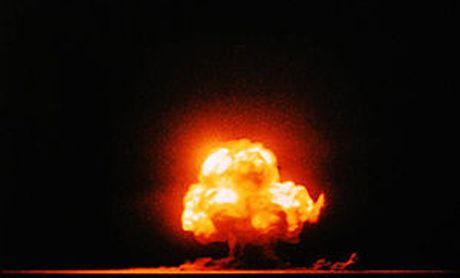Features
You are here
Nuclear weapons are still the threat they always were

November 25, 2013
While there’s debate about Iran’s potential to become a nuclear power, including its recent deal—slowing its nuclear development program in exchange for lifting some sanctions—there is silence towards the massive existing stockpiles of nuclear weapons that threaten the world.
Two hundred years ago, the French revolutionary Jean-Paul Marat warned us, “Watch out, for as soon as it pleases them they’ll send you out to protect their gold in wars whose weapons, rapidly developed by servile scientists, will become more and more deadly until they can with a flick of the finger tear a million of you to pieces.” Nuclear weapons have made this prediction a constant threat, driven by capitalism’s military competition.
The economic crisis of the 1930s was only “solved” by world war—with decimated continents that needed to be rebuilt, and a permanent arms economy that continues to grow. The Manhattan project provided an unlimited budget to develop the atomic bomb, which unleashed horror on Hiroshima and Nagasaki in 1945. Then the US recruited Nazi scientist Wernher von Braun into its militaristic space program, and entered a Cold War with imperial rival USSR—including the absurd fallacy that nuclear weapons are necessary to prevent nuclear war, which nearly led to nuclear annihilation during the Cuban Missile Crisis.
Nuclear proliferation
This absurdity continues. The so-called “security council” of the United Nations (US, Russia, UK, France, and China) is made up of the most dangerous countries in the world, which sell the most weapons and possess their own nuclear weapons. France would never test its nuclear weapons in Paris, but has made use of its colonies for these dangerous tests—from Algeria to French Polynesia. Since 1945 there have been more than 2000 nuclear tests and explosions around the world.
The West not only encourages nuclear proliferation through its own weapons programs, and those it encouraged in others—like the US-India nuclear deal—but also through its threats of war. The US invaded Iraq and Libya when its dictators did not have nuclear weapons, but has not attacked North Korea, which does possess nuclear weapons—encouraging countries to develop nuclear weapons if they want to avoid being attacked. While the US has threatened to attack Iran for developing nuclear power, the US supports nuclear armed Pakistan, India and Israel (the most dangerous country in the Middle East).
Nuclear near misses
With the world brimming with nuclear weapons, it’s no surprise there have been near misses—which have brought the world perilously close to devastation.
According to the investigative journalist, Eric Schlosser, a US Air Force plane broke up in mid-air in 1961 and released two operational H-bombs over Goldsboro, North Carolina. Each bomb was over 200 times as powerful as those dropped on Japan in 1945. The only reason the H-bombs did not detonate was due to a faulty switch. Had they detonated, millions of Americans would be dead and still dying.
On October 27, 1962, American warships in international waters began dropping depth charges to force a nuclear Soviet submarine to surface. The submarine’s three commanders had lost touch with Moscow and feared nuclear war had broken out. Their orders were to launch their nuclear missile if all three concurred. It was Vasili Arkipov who held out, urging the others to wait. Arkipov prevailed and probably averted nuclear war. The American historian, Arthur Schlesinger, called it the most dangerous moment in human history.
In 1983, a satellite malfunction at a USSR tracking station made it appear the US had launched a nuclear attack. The duty officer, Stanislav Petrov, like Arkipov, waited a few critical minutes and did nothing before rightly deciding it was a false alarm. Had Petrov passed the warning to his superiors, there is no telling what they would have done considering the tension between the USSR and the West in 1983.
In recent months there has been a spate of safety failures at American nuclear facilities and sackings by the White House of high-level personal responsible for nuclear weapons safety. According to Schlosser there were about 700 incidents and accidents involving hundreds of warheads between 1950 and 1968 alone.
Socialism or barbarism
The American and Russian governments and to a lesser extent other members of the exclusive nuclear club, still hold our lives in their hands and they are far from being safe hands. Besides the threat of accidental launches, the economic crisis is sharpening inter-imperial rivalry and pushing nuclear armed capitalist states towards military confrontation.
The combined threats of of climate catastrophe and nuclear annihilation—both just a matter of time if capitalism continues—make it clear we need a world free from economic competition that treats the planet as disposable, and military competition that promotes nuclear weapons. A hundred years after the “war to end all wars”, and the revolutionary challenge that arose to it, it’s clear the two choices Rosa Luxemburg summarized persist today: socialism or barbarism.
Section:
Topics:










